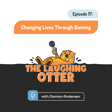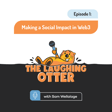Become a Creator today!Start creating today - Share your story with the world!
Start for free
00:00:00
00:00:01

Overcoming Fears with Brett Solomano
Brett Solomano is a Guinness World Record holder and stuntman for film and TV. He is also an entrepreneur, investor and truck business owner. Passionate about learning, growing and fulfilling his greatest potential, he loves teaching others how to overcome fears and barriers to success in their own lives.
Connect with Brett on Linked-in
If you want to know more about Brett's story or book him for speaking / coaching, check out his website www.AStuntmansGuide.com
Interested in Momentum Mastery? Click here for more info.
Transcript
Introduction to Brent Salamano
00:00:07
Speaker
Hello and welcome to Otterly Positive Talks. Today is going to be a super fun episode. We've got Brent Salamano, who's a SAG after award-winning stuntman for film and TV.
Teaching Mindfulness and Emotional Intelligence
00:00:21
Speaker
He's a current Guinness world record holder, a coach, an author, a speaker, spending over 10 years teaching and learning from sports professionals, performers, and athletes. The very best tools and techniques for mindfulness, emotional intelligence, and learning.
00:00:36
Speaker
giving you a higher mental and emotional capacity to overcome the fears and walk through the fires in your own life. This is going to be a lot of fun. Welcome, Brett. Thanks, Jeff. Thanks for having me. I'm looking forward to chatting and I'm really grateful for the opportunity.
The Path to Becoming a Stuntman
00:00:52
Speaker
All right. So the first of all, I think I'm going to ask the question that everybody asks. Uh, well, I think it's on everybody's mind. How does somebody get into being a stunt man?
00:01:06
Speaker
How does someone get into becoming a stuntman? It's it's one of those jobs that you never see on LinkedIn or indeed it's not posted as like, yeah, we're looking for someone with a
00:01:22
Speaker
degree from such and such university and being a stuntman, it's much more of an entrepreneurial performer freelance type of job in that way. And you either have to sort of accidentally fall into it kind of thing, no pun intended, where you have skills in other areas, perhaps it's driving, perhaps it's working with horses or
00:01:44
Speaker
might be a competitive fighter or gymnast and you get you get sort of scouted by a stunt coordinator or if you're like me it's it's the kind of job you always wanted to have you thought it'd be cool it'd be fun it'd be something different every day very creative and you pursued it from a young age so it's about networking it's about surrounding yourself with other stunt performers who can lift you up and teach you things get you you know
00:02:11
Speaker
get you a mentor and then you learn the ropes again no pun intended and you learn the the ways of doing things and you just keep keep going and you the better you get and the more people like you um like any other freelance job the more people want to work with you and and put you in their shows so so growing up were you always a bit of a thrill seeker like did you did you uh
00:02:39
Speaker
Were you always scaring the heck out of your parents? Is that kind of where it all started?
Creative Beginnings and Family Influence
00:02:44
Speaker
I was about to say no until you said scaring the heck out of my parents. I wouldn't say I was a thrill seeker. I definitely was a dreamer and I was creative. I was always making my own movies with webcams. You know, webcams just came out around that time when I was growing up in my teens.
00:03:04
Speaker
And yeah, we would make movies with little army men and blow them up in the backyard and things like that. My dad was a industrial chemist, so he was always around different chemicals and working in a chemical factory.
00:03:19
Speaker
So he had the skills and he taught me the right way on how these magic tricks and films are made. And yeah, we'd be swinging on the Tarzan swings into the lake. I grew up on a river with a big lake on it. So we'd be doing all sorts of stuff in the river there and riding our bikes around. And that kind of country lifestyle definitely leans into it. There's a lot of stunt performers who grew up in the country on motorbikes and things like that.
00:03:45
Speaker
So that is kind of where it started. I wouldn't say I'm a thrill seeker though. I'm much more meditative than that and thoughtful than throwing myself into it and hoping for the best. So it's a lot more meditative than what people might think, although there is an element of adrenaline perhaps as well, just a slight spice to that. I can relate to a lot of that because I grew up on a lake in the country
00:04:15
Speaker
Um, same thing on, on our dirt bikes and just always, uh, getting into mischief and stuff and, and trying things. And, um, so I can, I could definitely, like a lot of the, a lot of the friends I had growing up could definitely been, uh, uh, categorized as stuntmen without probably the, the, the methodical approach that you were talking about. Yeah. Yeah.
00:04:44
Speaker
I watched the, those Darwin awards and I go, yeah, we tried that. Yep. We tried that. We just, we, we just, uh, by the skin of our teeth walked away from it. So yeah, the skin of our knees is more appropriate for me. Yeah. Yeah. A couple of years ago, when I came to Australia, I went to, um, went to a sheep farm up on the, up on the Murray river and the,
00:05:14
Speaker
to visit, uh, some farmers I knew and there's their kids were home from university and we Jerry rigged up a, uh, a zip line over the river using a pulley system in a, and a big farm truck in a, in a tire. And we spent the day flying across the river and then that, that wasn't fun enough. So then we started letting go halfway, uh, across.
00:05:43
Speaker
Um, and I think a lot of people would go like, what are you guys nuts? But that was just, uh, parson parcel, part and parcel of, uh, growing up in the country. We did all sorts of crazy stuff like that. So I get a lot of, yeah, I can definitely relate. Fantastic. And then of course, uh, as you do, um, a few beers after that and, uh, sitting on the porch and yeah, it was a great, great weekend.
Career in Stunts and Entrepreneurship
00:06:13
Speaker
So how does being a stuntman and everything that you were doing in that career translate into what you're doing now?
00:06:24
Speaker
So I still do stunts. It's a fun, it's definitely a fun job for me, but it's never been something that's like full-time 24-7. I love it. I love everything about it, but I also really enjoy other aspects of business. So I've got a truck business. I've got several semi-trucks that I have drivers drive around Georgia to different shipyards and rail yards and things like that.
00:06:54
Speaker
And I also do public speaking and coaching on overcoming fear when I was
00:07:01
Speaker
Starting out, you know, you tell people what you do, you meet them at a party or something. What do you do? I'm a stuntman. There's a kind of questions, the same questions you get asked, you know, and like what you asked, one of the most common questions is how do you get into it? And one of the other ones is, you know, what kind of crazy stunts have you done? And then when you tell them that you've, you know, you crashed a motorcycle for the walking dead or you got set on fire for this other show, people go,
00:07:30
Speaker
They pause and they're like, what do you mean? Like, you actually do that? Like, don't you get scared? And I was always interested in personal development, right?
00:07:45
Speaker
constant conversation with myself around the question of why, you know, why are we here? Why are we doing the things that we're doing? And just thinking outside the box and being a stuntman is all about that as well. And being the intellectual that I am, I just love philosophy, psychology, and I always became very curious about, you know, I don't think I'm built any differently to everybody else. Like, I'm not wired differently. Maybe I just
00:08:11
Speaker
Maybe I'm just more thoughtful and that's not to say I'm better or anything than anyone else. It's just I do a lot of diary writing and journaling and I just became very curious around fear. What is it that stops somebody from doing something and how do I feel when I'm going to do a stunt like crash a vehicle or jump off something? What does that feel like for me?
00:08:36
Speaker
why can I do it and and what stops me if I can't and what are my fears you know and so that became very curious and it led to you know if somebody's scared of something obviously blocked and they stopped from what they want to have on the other side of that maybe it's success of some kind maybe it's safety you know they they're stuck between a rock and a hard place there's a lot of different examples with that that I could go into but it it all ties into
00:09:06
Speaker
you know, simpler things like procrastination and various things that stop us on a daily basis, not just our fear of sharks or the obvious ones like that, fear of flying or claustrophobia maybe. But I'm really fascinated by day to day what stops us from having the successes that we want to have. A lot of people say they want to be wealthy. A lot of people say they want to have relationships. A lot of people say they want to start a business. And yet,
00:09:33
Speaker
And I think we can all relate to this. There was something stopping us from taking the steps we wanted to take along the way.
Overcoming Procrastination and Fear
00:09:42
Speaker
And then once we've taken it, there's another block. And it's a constant assessment we need to be making moving forward with procrastination and self-worth as we grow. And all that stuff's really fascinating to me. So I've come up with a lot of different strategies for overcoming procrastination.
00:10:01
Speaker
you know, listening to our voices that we have in our head that stop us telling us we're not good enough, so that eventually we can, you know, have the skills and have the external stuff that we want to have, the business, the relationships, whatever, the money that we want to have. And all that stuff's really fascinating to me. I think we owe it to ourselves to really explore the limitations that we have, the fears and the procrastinations, the perfectionisms.
00:10:27
Speaker
that stop us and that's what's fascinating to me and I love to help other people to do that. Yeah, I think it's a, the one word that you've mentioned a few times there that people, I very rarely see procrastination linked to fear. Every time I hear people talk about overcoming procrastination, it's all more related to
00:10:56
Speaker
like laziness, just get on with it, just do it. But in my experience, just personally, when I'm procrastinating, if I peel back the layers and, and really get to why am I procrastinating? It's because I'm afraid of the outcome. And I've, and, um, it's, it's, and that was, uh, like in, in school and university, I was a, um,
00:11:24
Speaker
a huge procrastinator when it came to writing essays and those sorts of things. Um, but when I looked back, it wasn't because I was lazy. It was because I was afraid that I was going, I wasn't going to do as good a job as I expected from myself. So that it was the fear of just getting it out there. And, and I, and I even to this day,
00:11:54
Speaker
When I find myself procrastinating with my business and in my professional career, it's typically because I'm afraid of, am I doing this correctly? Um, so yeah, it'd be interesting to hear more on like, okay, so you spent a lot of time analyzing this and a lot of introspection and a lot of observations. What are some of the conclusions that you've come up with?
00:12:21
Speaker
Yeah, it's you can boil it down to just really simple principles or you can get in and explore the nuts and bolts, you know. And I think it's important to take a step back first.
00:12:36
Speaker
And I'll use the example that we all have of procrastination where we want to achieve something. Maybe I should go out there and pursue that relationship because I'm single and I want to have something with other people in my life. Or maybe it's I want to start that side business or I want to get a qualification that allows me to get another job.
00:12:58
Speaker
But I had a big day. I'm just going to sit on the couch for an hour. And then four hours later, it's time to go to bed. And we've just lost that opportunity to take action in those several hours on that goal we want to take. And then we say, well, I had a big day. And we justify it. And we say, well, I needed some rest. So I'll just have a bit of a rest for a bit.
00:13:19
Speaker
And it's because we're very comfortable, perhaps. We have everything we need right now to survive, but we want to have these other things. We want to have the business and the extra income and the other people in our lives. And so we're constantly comfortable, but we don't take action because of if we take a step back again, what is it that caused us to sit on the couch?
00:13:44
Speaker
And I look at, a lot of my coaching is through a system I teach called program theory. And it's all about treating everything you do, everything you think, everything you believe, all your habits. Everything is a program. And it's not meant to make it mechanical, it's just meant to make it very simple. So you say, okay, I got home and I sat on the couch and started watching Netflix and I couldn't get off.
00:14:11
Speaker
What stopped me from then getting off the couch to do something else? Well, Netflix or maybe it's social media, they're all designed to keep us engaged in the platform because that's how they make their money. But what stopped us from breaking away, because you know, if there was a fire in the house, you would have been out there quick, out of there quick, smart, right? So, you know, peeling back their habit even, you know, an hour beforehand, the thought of
00:14:38
Speaker
I'd need to have a rest probably came into your mind at some point. So if you can look at that as a program where I had a hard
Using Habit Trackers for Success
00:14:44
Speaker
day at work, maybe it was a good day and it was a bad day, but at some point you justified yourself to say, I'm going to sit on the couch for a bit.
00:14:50
Speaker
instead of giving yourself another form of nourishment, such as, you know, I'm just gonna do some pushups for 15 minutes, or I'm just gonna go for a walk around the block, or I'm gonna call somebody to give them something, give them some love, or maybe receive some love, something like that. Because all these other things, they nourish us in different ways, and I don't think they are as chronically stimulating as the doom scrolling of social media, which may,
00:15:19
Speaker
tie us down to the couch for an extended period of time. We all know that feeling, right? So what I've started to do in particular with that example is just to get more usefulness out of my day is I have my to-do list and I have my habit tracker. And every moment of the day that is spare, I'm coming back to those two.
00:15:41
Speaker
And I will have on my habit tracker, I'll have exercise and there'll be some basic parameters that I need to tick off to check off that day that I did some exercise. It will be even things like have a shower, brush teeth, various things like that, because we I believe we need to have something to focus on. Otherwise, things will come to us. You know, if you're not
00:16:07
Speaker
going to somebody with your agenda, somebody is coming to you with their agenda. So it's very important to set your own agenda and when you have low self-esteem, when you have fatigue, when you have procrastination, when you have perfectionism, whatever it might be, if you can just say, well, I'm just going to tick off one thing.
00:16:26
Speaker
I'm just, you know, it's on my habit tracker to do a walk around the block because I know that gets me outside, gets me some fresh air, gets my blood moving a little bit. Maybe if you're more aggressive, maybe it's to do a couple of hundred pushups or a gym session or something like that, go for a run. But anyone can set that just to get themselves away from those things that make them get in their comfort zone and they know they're going to procrastinate with and around.
00:16:53
Speaker
So again, if you set yourself up to
00:16:58
Speaker
Just do this. Okay, I've got my to-do list. Maybe there's some things on my to-do list. Maybe I've got to send that email or do that thing. If you break it down in very, very small chunks, 15-minute walk or a quick email, before you know it, the 15-minute walk becomes, well, I'll do the walk and maybe I'll run and maybe I'll do some push-ups as well because now it's not just, oh, well, I'll just do one movie. Oh, now it's another movie. Now it's another movie and then you lose your four hours. You're going the opposite direction now. Does that make sense?
00:17:27
Speaker
Yeah, it absolutely makes sense because I employ a lot of those techniques. But as I've gotten older, because I've lived my life primarily as someone who is always looking to achieve. And that's why I run my own business, and I've had the career I've had, and et cetera, et cetera.
00:17:56
Speaker
But as I've gotten older, I've looked around and I'd like to get your, your thoughts on this. I've looked around at my social circles and many of the happiest people I know are the people who don't do any of those things. And they, they're just like, they're just, they're, they're mates of mine that I like, like arguably are the same people.
00:18:25
Speaker
that they were when we left high school, not that they, you know, they have families and whatever, but they never wanted to be any more than what they are. And, and I, I, in a lot of cases, I just, I, I, my observation, they love themselves at 20. They love themselves at 50. They, they're happy. They, they, they derive, um, enjoyment from their hobbies and their friends, their family.
00:18:55
Speaker
And, and, and simple pleasures in life, like a cold beer or a barbecue, that's all they need. And, and I sometimes wonder if the messages, uh, uh, this like, cause one thing that hits home with that hit home with me, what you're talking about is I never almost like, it's very rare that I spend an hour on the couch because I.
00:19:23
Speaker
if I'm on the couch for an hour, I start feeling guilty. And, but the flip side of that is there's a lot of times I'm exhausted and I don't lie down. So I've just like, I'm just wondering where that balance is. Um, uh, because I think, I think both. Yeah, it's a very good point. And, um, you know, I think, uh,
00:19:52
Speaker
in the pursuit of happiness, we can say, oh, well, what I have right now is not good enough because I want to have a bigger, better house. I want to have a bigger, better job, more income, better friends, better partners. And there's nothing wrong with wanting. I think it's a very human thing. What can be the challenge, though, is where we start putting ourselves down, putting our friends down and saying, what I have right now is not good enough, and what I have right now is even bad.
00:20:20
Speaker
And sure, you may be a little bit uncomfortable, but a little bit of healthy discomfort can motivate you to strive for something more.
00:20:29
Speaker
That is the challenge of the successful person, the person like you and me, Jeff, who are striving for new things. In the striving, we are projecting into the future a better situation, and then there's the contrast there. Contrast is a beautiful thing, but too much contrast, you start getting extremes. You think of two big, powerful magnets.
00:20:55
Speaker
That over there is going to be amazing because this right here right now is terrible. And it's important, I think, to just balance it a little bit more and say, yeah, that would be more interesting. That would be more my style to have that. I like this, but I think I want to explore that a little bit more. And that's a much more healthy language. Coming back to the what you're saying about the friends from high school and that sort of thing, you know, I have a lot of
00:21:19
Speaker
I wouldn't say I have a lot, but I went back to
Balancing Success and Contentment
00:21:22
Speaker
see some friends in Australia recently and there's no better or worse, but they have had their nine to five jobs and they've got their family and that's their thing. They've got their same hobbies and same social circles.
00:21:38
Speaker
And who's to say who's more happier? Maybe they're more stuck. Maybe they're actually unhappy and they don't know how to get out of it. And that's not to say I'm better or worse. Again, measurement, maybe they are happy and that's all they need. People like me, I need to be exploring. I need to be building something and gently chasing something new.
00:22:04
Speaker
Coming back to the procrastination conversation, Jeff, I think it comes down to, can you honestly sit with yourself?
00:22:12
Speaker
Pat yourself on the back and say, hey, you got this far, you're doing great. If you're sitting on your bed, that bed's yours. You got that. You got that given to you by a good friend who loved you because you loved them, or maybe because you had the money to buy that bed. So pat yourself on the back for that. And then gently keep moving for the next thing. Because life is going to move whether we want it to or not. But we need to keep looking at what is moving for us and to us, toward us, and away from us.
00:22:42
Speaker
Be the creator, be the instigator of that just a little bit more. Otherwise, the challenges that come to us can be a little bit overwhelming instead of us going to that challenge and taking it with a bit of gusto. Yeah, I think there's so much of what you're saying resonates. And I think, I don't know if you would attest to this too, is that because I grew up in a really small town,
00:23:12
Speaker
Um, if you grow up in the country, there's, there seem to be like two very distinct people I grew up with. There was, there was the percentage of people who just loved that lifestyle, love, just, uh, like, um, a very predictable, uh, I don't even want to say negative because I love a lot about the country lifestyle. Uh, but there was also.
00:23:40
Speaker
The other half of the people or I don't know what percentage, but the other percentage would be like me and my brothers and a lot of my other friends who never stopped looking at the horizon because right from a very early age, my brothers and I were like, we're leaving this town. We're going to explore this world. And as a result, like I grew up in Northern Ontario in Canada. I live in, I live in Melbourne.
00:24:08
Speaker
My older brother lives in, in Portugal and has lived all over the world. And my younger brother now is, has spent the last two years sailing a sailboat around the world. And so it's just, I think, I think it's, uh, it's just that it just seemed that you either fell in one of the two camps, you were either really content and we're going to spend your life living in the small town or.
00:24:38
Speaker
you were going to leave, but those that left never stopped looking at the horizon. And that's, that's something I struggle with is, um, and what I've struggled with my whole life is the concept of when I achieve X, then I'll be happy or when I get moved to wherever I'll be happy and forgetting to live for today. And that's, that's a really interesting balance.
00:25:06
Speaker
It is. It takes a lot of self-care to balance that, as you say, Jeff, with the, you know, I'm not quite where I want to be. I don't quite have the vision for myself in the physical that I can see in my mind, but I'm working towards it and it's okay.
00:25:27
Speaker
It reminds me of, it's so beautiful we're talking about Jeff, because I can relate to that country town vibe. There were the two types of people, the people who left straight away, and then there was the people who stuck around in the country town that I grew up in. And again, neither right or wrong, I felt like a bit of an alien, I just knew I was going to be
00:25:46
Speaker
built for greater things and bigger things and again, no right or wrong. Someone needs to lead and someone needs to follow. Someone needs to be in the country towns and someone needs to be in the city and travel to different parts of the world and spread a message and that's what I like doing.
00:26:03
Speaker
Yeah, I think back to, I saw recently, it's a wonderful life. 1947, you know, it's nearly 80 years old. And it's one of the greatest movies, I think it's such a beautiful movie about the dichotomy of a man who wants to leave his country town.
00:26:20
Speaker
and go and become a big real estate investor. And yet he still stays stuck in his country town feeling like he's got no contribution to the world. And yet as the movie progresses, he gets to find out exactly what his contribution is. And it's a it's a beautiful story. I can't believe I waited so long to see it. You know, I've I've been meaning to see to what I've heard so many good things about that movie, but I've yet to watch it. So I'm going to make a point.
00:26:50
Speaker
I'll put that on my to-do list. The next time I sit down, I'm going to make a point of watching that as well. Please do. Yeah, I think you'll love it, and I'd love to hear what you think, because it relates a lot to what we're talking about, the pressure we feel as a human. And coming back to procrastination, Jeff, it's like
00:27:11
Speaker
I often wonder how much free will we actually have because I do believe we are just a bunch of programs because if it was easy and we had all the free will, we could just say, well, I'm going to start a business and I'm going to do all of the things. But there's so much, I think we have free will, but we're bombarded against issues of self-worth and our mother's voice in our head and our father's voice in our head and that bully that is still in our head from when we were in primary school.
00:27:39
Speaker
And there's so much bombarding us, telling us we're not good enough, telling us we're amazing and we can get stuck in all that if we're not careful. And so I really, really enjoy as a coach piecing that together and peeling apart with my clients so that they can find the language they need to be out across that hurdle and just, you know, they can't do it, they can't do it, then something clicks and then they can do it, whatever that thing might be and they can overcome that barrier they have. Yeah, I think
00:28:10
Speaker
One of the I've never I've never studied this but I have a and I don't know if anyone else has but one of the theories I have that leads a lot to that that fear that debilitating fear that leads to procrastination or lack of action is the fact that and it's pretty much cross cultures is
00:28:36
Speaker
As human beings, it's a real negative trait. We tend to over exaggerate failures and under exaggerate successes until the successes become extreme. Most people have memories of growing up in school of
00:29:05
Speaker
making a mistake or dropping the ball or missing a shot that are very strong and vivid. But there is a disproportional amount of memories of when you actually were successful. So for some reason, that emotion of being embarrassed or made a fool of yourself or whatever is so strong
00:29:36
Speaker
that people stop, people stop talking out in class and people stop, um, trying because the, the really ridicule from failure is so much greater than the accolades of success until the only time that changes is when you are a superstar, when like, um, until that point everybody
00:30:05
Speaker
just points out the failures like, Oh, you're not good enough. You're not, you know, you're not going to be a musician. You're like, you're not going to make it. So just, just stop, um, or whatever that is. And I think that's, yeah, it's just, uh, I try really hard with my son and you know, the, the kids in my life and the people in my life is to, to really,
00:30:32
Speaker
overemphasize the successes and when they do good and then downplay the times when they drop the proverbial ball. It's just an interesting part of human dynamics that we just love to shame people. We love to laugh at people. We love to ridicule people who try. It should be the opposite.
00:31:01
Speaker
If you fail at business 10 times, you should be like, well, good on you for trying. Absolutely. Yeah.
00:31:09
Speaker
And I think just to chime in, because I think there's a lot to that, Jeff, what you're saying. Back in the tribal days where humans lived in groups of 50 to 100, whatever it was, I'm not super knowledgeable on that type of time period. But there were tribes back then when you would live and die with this tribe, this family unit that you would have.
00:31:35
Speaker
for you to stick your neck out and say, actually, can I have this instead of that? Or can we go this way instead of that way? That might have meant exile. And maybe you would be kicked out of the group. You would have been ridiculed, perhaps, for thinking differently or dressing differently or trying hard because you served the tribe. The tribe needed you. And that was a way of keeping the tribe together for the tribes
00:32:01
Speaker
own success and health And I still think there's a lot of that left over in society where we do ridicule each other and put each other down certain cultures will put each other up in public or down in public and Talk about each other behind each other's backs. I know in Australia We have the the tall puppy syndrome and I faced a lot of that when I moved to the US I say how moving to the US I'm gonna get in the film industry and people say well, you know, have you thought about
Societal Pressures and Self-Belief
00:32:28
Speaker
it? What are your parents think? Do you have much money saved up?
00:32:31
Speaker
And I just knew I was going to figure it out, you know, but they, they, uh, an external program, you have your internal mental programs and they have their external program. A program is something that runs if this, then this, they just constantly showing up and keeping their position. And that's the challenge with, with success and growth. Jeff is the, uh, we have to keep pushing ourselves and stretching ourselves. Um,
00:32:58
Speaker
You know, it's like you imagine a tarpaulin that's kind of sitting there and you poke this bit up and you have to come along and poke that bit up and then kind of keep poking up all the bits to get this tarpaulin to rise equally as you lift it up. And you're raising it up because if you only raise one bit, it's going to stretch and tear. And I think that is a really good visual metaphor for us as we become successful.
00:33:22
Speaker
just like those lottery winners that make millions of dollars and within two years they're back down to the same level or worse because they didn't allow all their other skills, all their other programs, their habits, all their people in their life to rise up with them. It happened too quick. I mean, it was a very, very
00:33:42
Speaker
imbalanced program, very high level program of having all this money. And the system is going to equilibrate back down to wherever all the strongest programs average out to be. And that's something for people to remember, I believe, when it comes to procrastination and overcoming fears and barriers as they become more successful or strive to become more successful even.
00:34:04
Speaker
just to listen to what's the weakest link here? Do I believe I'm not worthy? Maybe I've got old friends holding me back. Maybe I should just gently let those friends fall away. Maybe I need better support groups, better networks, better resources, better environments that can push me or pull me towards where I want to go, not hold me back down. I think those are all really good points.
00:34:33
Speaker
Where I kind of, whenever I get into that situation where I'm starting to doubt myself, I remind myself of one thing and I've come like, just personally, I've come to the conclusion that if you can just believe in yourself and you just, and you just like yourself or you love yourself and you just go, you know what? I'm, I'm fine. Um, I'm just, I'm, I'm fine.
00:35:03
Speaker
I'm just as good as anybody else. Nobody else out there is that goddamn special that I have to really doubt myself. Um, I have as much validity as anybody else does. Once you get to that stage and you really honestly believe it, then all of a sudden a lot of those fears go away because it's like, well, you know what? I may as well give it a go because I got as much chance as anyone else succeeding. Uh,
00:35:34
Speaker
Because one thing that I've come to the conclusion in this world is that the normal distribution curve when it comes to all aspects of humanity is very, very narrow and tall. We're all plus or minus a few percentage points of each other in all things.
00:36:03
Speaker
like in the aggregate. And so if people can just believe in themselves and just realize that nobody else out there is all like really that amazing and everybody else has their own doubts and challenges in their own different ways, then you start being able to approach things with less of those fears. And that took me a long time
00:36:32
Speaker
to, to realize that like, even when I was having successes, I still always had that, that self doubt and maybe it's the humility of being from a small town or whatever the reasons were, um, that, and that held me back and that, that there was always this fear that everybody else knew something magical that I didn't know. Where in the reality, as you get older, you just,
00:37:00
Speaker
You're meeting people all the time and just go, actually, nobody's got a secret sauce. There's no nothing that anybody's doing. That's all that miraculous. It's, um, yeah. And, and like, you know, you know, where, where this thought hit me is I was sitting in a very busy intersection here in Melbourne about 15 years ago, uh, sit in my car and there was, um, maybe 50 people on each corner.
00:37:30
Speaker
Uh, getting ready to walk across the street, waiting for their lights. So, but let's say for a sample size of about 200. And I looked around and it just, I don't know why it just struck me as like, I just thought nobody of these 200 people is exceptionally ugly or exceptionally attractive. Everybody is average.
00:37:57
Speaker
And then I started looking at all aspects of my life and I just came to the conclusion that everybody is plus or minus average by a few percentage other than, you know, like the, the, you know, I play golf. Everybody shoots between 80 and a hundred. There's some, I got one friend who happens to be extraordinarily horrid, probably should never touch a golf club. And I got one friend who is,
00:38:26
Speaker
low single digits, everybody else is in the middle. And that's kind of, that's just life. And, and so many people, because the Laughing Otter is all about mental health and, and being happy and, and just, and, um, and that's one of the messages that I, that I, I try to, um, to let people know is at your core, you're just fine. Yes.
00:38:54
Speaker
Go after your dreams, pursue what you want to do, but not at the detriment of thinking that, that you're not good enough and everybody else is somehow doing something special. Um, even, even like, like I spend a lot of time in LinkedIn, all the hero worship of people like Jeff Bezos and Bill Gates and, um, Elon Musk is the, the, the, the one of choice these days.
00:39:23
Speaker
if you meet them as human beings, I have no doubt that there, there would be nothing exceptional about them other than the fact that some things fell in place and it just worked out. And once you start getting the momentum, you'll be fine. Um, so like they're not, there's nothing like so extraordinary about them that everybody else has to,
00:39:52
Speaker
doubt themselves, like I can't achieve that because I don't have that DNA. Everybody else is fine as long as you just get on with it.
00:40:02
Speaker
Yeah, I think just following up on that, Jeff, I think I do agree. I think we're all just a little bit around the average, you know, and certain people may have a little bit more interest in or skill in a certain area. And that's what they get praised for. And that's what they lean into throughout their younger years. And then that gives them the success because they get the validation early on, perhaps.
00:40:26
Speaker
Um, but that gives them the persistence. I think whether you are gifted as a child or whether you're not, whether you have to hustle every day, whatever, whatever you want to get, if you just persist a little bit, um, you'll, you'll get there because if everybody is, well, maybe I'll take a step in that direction tomorrow.
Persistence Over Talent
00:40:46
Speaker
Oh, no, no, no. Next week. No, now I'm going to take a step over here. It's very random and haphazard and chaotic.
00:40:53
Speaker
And the people who become successful are the ones who show up every day and do a little bit more. And it doesn't take much because if you just take one step in each in that same direction every day, it doesn't feel like you're moving very fast when you see people running and there's other people running around doing all sorts of stuff. And it looks very busy. So you think, well, that must be success because these guys look like they know what they're doing. But
00:41:16
Speaker
Successful people that I really admire, I think are the ones that have just devoted themselves to something they love, very simple. For me, it's systems around learning, being an inspiration to people. There's a few themes in there, you know, as a stunt performer, as a business owner, it's systems around learning and being better every day. And the more I step in that direction, the more I learn something and apply something, that is taking me in the direction of my own successes. And that's what's super exciting to me.
00:41:46
Speaker
I think that's a fantastic message and I'll just round it out with success has nothing to do with money. Whatever your passion is and wherever you fill enjoyment, I know people who are exceptional mothers and fathers. I know people who are exceptional fishermen. They'll never make any money from fishing,
00:42:15
Speaker
every time they go out, they catch something because that's what they love. I know there are people who are exceptional Lego builders who just do it in their house. It's just being exceptional at what you love to do. I'm lucky my network of friends, there's probably 15, 20 of them that are amazing cooks and we love going to their house because you know you're just going to leave because they've put their
00:42:45
Speaker
passion into that. It doesn't have to be anything that anybody else knows about. It's just what gets that bounce in your step in your life. Money's just a byproduct sometimes of that, but it first starts with you leaning into what makes you happy, as you say, and taking the steps. Absolutely.
00:43:10
Speaker
This has been one of my more enjoyable podcasts, not that the other ones haven't been fun, but these are just topics that are really true to my heart and a big reason why I started The Laughing Otter. So I really thank you for coming on the show and I think it's been a great conversation. I would love to sit next time you're in Australia or if I make my way to Georgia,
00:43:40
Speaker
Um, be great to sit, uh, and have a few points together. Cause I think we could talk for hours. Um, just fascinating. Yeah.
00:43:50
Speaker
Yeah, super exciting. On a topic you both enjoy, it can be you end up talking for hours and yeah, it's just a good sign. And that's a pathway we all get to take when we get on a good path, you know, whether it's a conversation or a physical journey, you find the right thing and those steps become really easy. Yeah, absolutely.
00:44:12
Speaker
So what are you up to? Where can people find you if they want to reach out and they want to learn more from you, that sort of thing? Where do they find you? Absolutely.
Contact Information and Resources
00:44:22
Speaker
So you can find me on LinkedIn. I spend a bit of time on that if you're on LinkedIn yourself. Also, if you want to hear more about me from my coaching, speaking or writing, go to astuntmansguide.com.
00:44:38
Speaker
I'm starting to blog a lot more on there now, and just get that rhythm of sharing my ideas for myself and for other people. One of the things that I'm also doing, and I did this a little while ago with a great success, so I'm starting to make this a more serious thing. It's the concept of momentum mastery. And what we do when we take a step in life, that just gets us to a spot. But we need to develop that momentum.
00:45:06
Speaker
you know, speed is nothing without acceleration. So we have to keep accelerating our lives and to do that we need to keep overcoming fears. So I have this little group, this accountability group where we meet up and online of course and there's a video every day for this little fear that you have to overcome and it's a very simple fear but it's just to get that fear muscle going to encourage you to
00:45:32
Speaker
Keep pushing yourself, finding your own edge and that translates over I believe into all areas of life to encourage you to be comfortable with getting out of your comfort zone or as they say, getting comfortable with the uncomfortable. So I'd love to share that with you guys a lot more and yeah, please go to my website astuntmansguide.com forward slash momentum mastery if you're interested in hearing more about that.
00:46:00
Speaker
Uh, and we'll, we'll, uh, we'll definitely put the, the links in the show notes so that people can just click on them and find that that sounds, I think I'm going to sign up for that. That sounds awesome. Um, again, yeah. Um, so again, thanks a lot, Brett, for being on, uh, on the show. Uh, thanks everyone for listening. Go to the laughing otter.com. If you want lots of positive content and things to do.
00:46:28
Speaker
We're the laughing artists on all sorts of, all the social medias. You can find us there. And remember, we all deserve to be having a lot more fun.


















